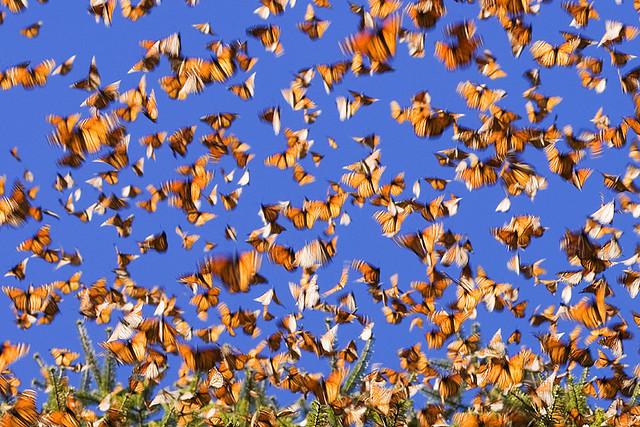
What’s a butterfly worth? As it turns out, Americans place a high value on monarch butterflies. In a paper published today in Conservation Letters, Dr. Leslie Ries, a research fellow at the National Socio-Environmental Synthesis Center (SESYNC), and co-authors revealed the results of a recent survey that suggests Americans are willing to support monarch conservation to the tune of $4.78–$6.64 billion.
If even a small percentage of the population acted upon this reported willingness, the cumulative effort would likely translate into a large, untapped potential for conservation of the iconic butterfly.
Monarch butterfly populations have been declining across Mexico, California, and other areas of the United States since 1999. A 2012 survey at the wintering grounds of monarchs in Mexico showed the lowest colony size ever recorded.
“The multigenerational migration of the monarch butterfly is considered one of the world’s most spectacular natural events,” said Jay Diffendorfer, a USGS scientist and the study’s lead author. “However, managing migratory species is difficult because they can cross international borders and depend on many geographic areas for survival.”
Much of the decline in monarch numbers has been blamed on the loss of milkweed, the native plants on which monarch caterpillars feed.
“While many factors may be affecting monarch numbers, breeding, migrating, and overwintering habitat loss are probably the main culprits,” said Karen Oberhauser, a monarch biologist at the University of Minnesota and a co-author of the study. “In the U.S., the growing use of genetically-modified, herbicide-tolerant crops, such as corn and soybeans, has resulted in severe milkweed declines and thus loss of breeding habitat.”
The authors suggest that the universal popularity of monarchs could encourage a market for monarch-friendly plants.
“This is the first nation-wide, published, economic valuation survey of the general public for an insect. The study indicates that economic values of monarch butterflies are potentially large enough to mobilize people for conservation planting and funding habitat conservation,” said John Loomis, the lead economist on the study from Colorado State University.
Read the article, “National valuation of monarch butterflies indicates an untapped potential for incentive-based conservation,” at http://onlinelibrary.wiley.com/doi/10.1111/conl.12065/abstract.
Photo: Tarnya Hall, Flickr/Creative Commons